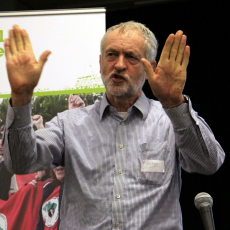
In my last article in this section, I wrote about how David Cameron has reinvented the Conservative party during his time as leader. In this article I am going to write about how life-long socialist Jeremy Corbyn has shaped the Labour party since he was elected to the position in September.
2015 will not go down in history as a good year for the Labour party. In the run up to the general election last year it looked like the party was to gain enough seats to form a coalition government with the Liberal Democrats and the SNP, under Ed Miliband’s leadership.
It was thought that Ed Miliband had done just enough to convince the British public (and drive Labour towards the centre of the political spectrum) that his party could be trusted with the economy.
Instead, in the election Labour lost 26 seats and the Conservatives won 28, meaning that the Conservative party could form a majority government – leading to the resignation of Ed Miliband and the start of a leadership contest in the Labour party.
Jeremy Corbyn‘s nomination by 35 Labour MPs opened the doors to a complete overhaul of the political make-up of the party. Upon his nomination, many socialists, young and old, signed up to become members of the party or registered so as to vote for their like-minded candidate. When he was elected three months later, it is thought many of those socialists who registered to vote in the leadership election then became fully paid-up members. A party which had essentially been social democratic (centre-left) for the last twenty-plus years now had a largely socialist base and a socialist leader.
Jeremy Corbyn has since proceeded to pivot the party further to the left, expressing an economic message based on entirely rejecting austerity (cuts to the state), whilst still wishing to reduce the state deficit. Perhaps more notable however, is the direction he is pointing Labour towards in terms of foreign policy. As someone who opposes nuclear weapons, he has set up a review which will look at what Labour’s position will be over the coming renewal of Britain’s nuclear weapons – previously the party was for the continuation of the nation’s nuclear deterrent. He has also raised the issue of whether the Falkland Islands should remain a British territory, in contrast to the last Labour PM Gordon Brown, who said there would be no negotiations with Argentina over the ownership of the islands.
Corbyn has also put nationalisation back on the agenda, by saying at the Labour conference last year that full nationalisation of the railways would be one of his first acts as Prime Minister if he were elected to the position in 2020. Ed Miliband had hinted at partial nationalisation of the railways if he became PM, but never committed to it as completely as Jeremy Corbyn has done.
So, do you think Jeremy Corbyn has what it takes to win in 2020?
Image: By Global Justice Now (Jeremy Corbyn) [CC BY 2.0 (http://creativecommons.org/licenses/by/2.0)], via Wikimedia Commons

0 Comment:
Be the first one to comment on this article.